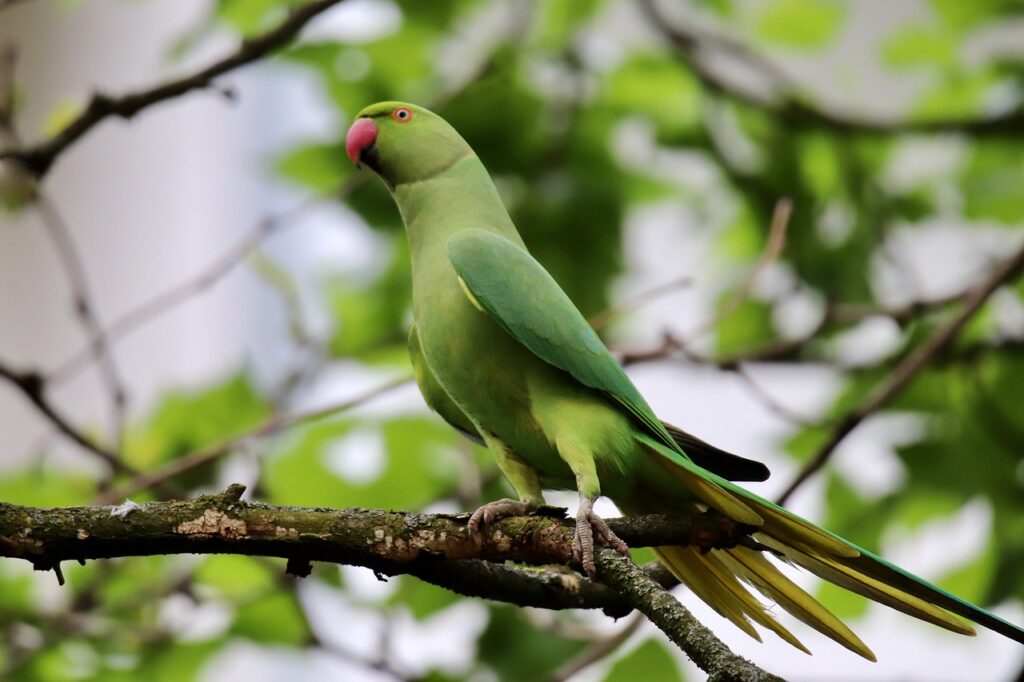The fading song of the Alexandrine parakeet in Pakistan has prompted a powerful alliance of conservationists and government officials to take decisive action. In a groundbreaking initiative, the Speaker of the Punjab Assembly has joined forces with the Pakistan Wildlife Foundation (PWF), Himalayan Wildlife Foundation, WWF-Pakistan, Islamabad Wildlife Management Board (IWMB), and the AJK Wildlife Department to spearhead a comprehensive conservation project aimed at reviving the Alexandrine parakeet population.
Scientifically known as Psittacula eupatria, the Alexandrine parakeet is one of the largest parakeet species in the world, measuring up to 40 centimeters in length. Known for their intelligence and problem-solving skills, these parakeets are highly sought after as pets, which has exacerbated the pressures of the illegal pet trade.
This species plays a crucial role in seed dispersal, forest regeneration, and maintaining ecological balance. However, their numbers have drastically declined due to habitat destruction, poaching, and the illegal wildlife trade. Urbanization and deforestation have destroyed essential nesting sites, especially old trees with cavities necessary for breeding. Additionally, the lucrative exotic pet trade in markets across the Middle East has further fueled their decline.
In response to these threats, the coalition has launched several strategic initiatives. Restoration projects are in progress to plant native tree species, providing vital nesting sites and food sources in areas most affected by habitat loss. The Himalayan Wildlife Foundation has also deployed local patrols around Deva Vatala National Park, effectively dismantling illegal poaching networks and arresting offenders.
The Psittacula Breeders Association, led by a prominent breeder, is committed to ethical breeding practices that adhere to conservation standards, distancing itself from the illegal wildlife trade.
Safwan Shahab Ahmed, a leading conservationist, emphasized the need for a targeted approach in the Kasur district. He advocates for a concentrated effort involving civil administration, law enforcement, and relevant organizations to focus on planting indigenous trees and combating poaching, which could lead to more significant and sustainable outcomes.
Despite these efforts, challenges remain. Inconsistent enforcement of wildlife protection laws, particularly in rural areas, continues to undermine conservation initiatives. Enhanced collaboration between Pakistan and neighboring countries is crucial to tackle the illegal smuggling of parakeets, which remains a significant issue.
Malik Muhammad Ahmed Khan, a dedicated advocate for nature conservation, has played a key role in rallying support from critical law enforcement agencies, including the Pakistan Rangers, the Civil Administration of Kasur, and the Punjab Wildlife Department. His efforts have been instrumental in mobilizing these agencies against illegal poaching and ensuring their commitment to protecting the Alexandrine parakeet.
The conservation of the Alexandrine parakeet is a vital test of Pakistan’s commitment to preserving its biodiversity. Led by Safwan Shahab Ahmed and supported by a coalition of organizations, government figures, and local communities, these efforts represent a promising pathway to saving the species. By addressing the root causes of its decline and implementing effective strategies, there is renewed hope for the parakeet’s recovery. This initiative serves as a model of collaborative conservation, aiming to ensure that the Alexandrine parakeet not only survives but thrives, contributing to broader biodiversity goals in Pakistan and beyond.
